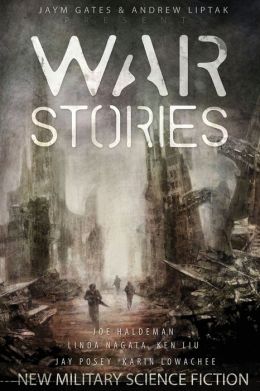"War
Stories
reveals the truth. War is what we are."
With
this statement, War
Stories
launches us into a dizzying, kaleidoscopic universe in which we see
combat and killing, and soldiers and civilians, in uncanny new ways.
The twenty-three stories in this anthology imagine scenarios ranging
from drone attacks in Syria to interplanetary conflicts involving
technology that is years ahead of our time; and it is this
juxtaposition of the near- and far-future that clarifies how much war
changes while staying the same.
Grouped
into four sections ("Wartime Systems," "Combat,"
"Armored Force," and "Aftermath"), these stories
consider war from a variety of possible angles and points of view.
There are clones and uploaded consciousnesses, PTSD sufferers and
drone operators, mothers and lovers. Many of the authors focus on
what the future holds for soldiers' bodies- how they'll react to
biological "upgrades," high-tech prosthetics, brain
implants, and even teleportation. Others consider the role of
militarized suits, advanced drones, and virtual reality.
I found several stories particularly compelling in this collection:
"The Radio" by Susan Jane Bigelow, "Non-Standard
Deviation" by Richard Dansky, "In Loco" by Carlos
Orsi, and "Enemy State" by Karin Lowachee.
The
first imagines a world in which "patriotic citizens" pledge
to donate their bodies to the war effort when they die, and those
bodies are then processed into a synthetic being that can re-enter
the combat zone. in "The Radio," a "synthetic"
nicknamed "Kay" is abandoned on the enemy planet after her
convoy is destroyed. With no more orders from headquarters and no
further purpose to fulfill, she falls in with a group of renegade
humans who have rejected the war completely.
In "Non-Standard Deviation," we learn about a project that
was meant to "create a bleeding-edge virtual reality space that
could be reprogrammed to represent any battlefield scenario down to
the granularities of terrain weather conditions, OPFOR tactics and
gear, and just about anything else you could think of." Trouble
is, the simulated fighters have become self-aware and when faced with
the man sent in to talk to them, declare that they refuse to fight
any longer. Thus, the virtual reality meant to help prepare soldiers
for "real war" has become a battleground in its own right.
I
found "In Loco" particularly interesting because it
envisions a kind of warfare that doesn't seem very far off: while
most of the killing is done by drones, humans with criminal records
are drafted to work specific, delicate missions, where they help
guide and orient their accompanying drones. When the loco at the
center of this story encounters men and women who are fighting one
another face-to-face, he realizes just how deeply he scorns
remote-controlled war and acts accordingly.
Finally, "Enemy State" is unlike all the others because it
is basically one long love-letter. Told from the perspective of a man
who's in love with a soldier on active duty, it asks us to consider
what war does to the families and friends left behind. There's the
soldier who keeps leaving for "the front," returning each
time with less of his former human self; and then there's the
soldier's lover, Jake, who fights his own inner war over whether or
not to wait for the soldier to return. The narrative voice is at once
hopeful, desperate, despairing, and triumphant. The inner life of an
emotionally-wounded noncombatant is exquisitely captured here.
So
let me put it this way: if you love anthologies that bring together
talented authors who all imagine the same topic in diverse, unique
ways, then go get yourself a copy of War
Stories
right now. GO.

No comments:
Post a Comment